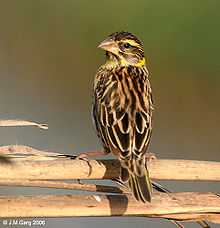Black-breasted weaver
| Black-breasted weaver | |
|---|---|
 | |
| At Hodal in Faridabad District of Haryana, India. | |
| Conservation status | |
| Scientific classification | |
| Kingdom: | Animalia |
| Phylum: | Chordata |
| Class: | Aves |
| Order: | Passeriformes |
| Family: | Ploceidae |
| Genus: | Ploceus |
| Species: | P. benghalensis |
| Binomial name | |
| Ploceus benghalensis (Linnaeus, 1758) | |
The black-breasted weaver, also known as the Bengal weaver or black-throated weaver (Ploceus benghalensis), is a weaver resident in the northern river plains of the Indian subcontinent. Like the other weavers, the males build an enclosed nest from reeds and mud, and visiting females select a mate at least partially based on the quality of the nest.
Distribution
Resident or local migrant, endemic to South Asia. Species is described as 'common' in at least parts of its range.[2]
It is found throughout northern part of Indian subcontinent.
Local Names: Hindi: Sarbo baya, Bengali: Shor baJa, Kantawala baya.
Description
- Size: Sparrow (ca. 15 cm)
- Appearance: Male in breeding plumage has brilliant golden-yellow crown, white throat and a black band separating it from the fulvous-white underparts. In non-breeding male and female, crown brown like rest of upper plumage; black pectoral band less developed. A prominent supercilium, a spot behind ear, and narrow moustachial streaks, pale yellow. Flocks about cultivation and around reedy margins of tanks and jheels (shallow lakes), or extensive tall grass areas.[3]
- Behaviour: Polygynous; colonial; on the whole similar to those of the Baya and streaked weavers.
- Courtship: Male constructs the nest single-handedly, with a group of females visiting it during late construction stage, jumping on the helmets and tugging and testing, presumably for strength. If a female appears interested, the male bows low before her, presenting golden crown at her. Flaps wings deliberately and sings softly tsi-tsisik-tsisik-tsik-tsik like chirp of cricket or subdued squeaking of unoiled bicycle wheel. Once female agrees and permits copulation, he quickly finishes the rest of the nest, and she lays eggs inside; he immediately commences on a second nest nearby to attract other females, and occasionally a third, very rarely even a fourth. Nests not accepted by females may be torn down by the builder himself.[4]
Nesting
- Season: June to September
- Nest: Similar to the streaked weaver; somewhat smaller and normally with shorter entrance tubes. Built in reed-beds in marsh, often moonj or kans (Saccharum spontaneum), with some of the growing reeds incorporated into the dome as support. Entrance tube is somewhat shorter than Baya weavers (up to about 25 cm). At the 'helmet' stage of construction a quantity of wet mud or cowdung is daubed thickly along the edge, with bright coloured scarlet or orange flowers or flower petals (Lantana, Lagerstroemia) incorporated; observations suggest that this is part of the courtship rituals and exercise a direct influence on the reactions of the visiting female, both for this species and the streaked weaver.[4]
- Colony: Singly or in scattered groups of 4 or 5; sometimes larger colonies.
- Eggs: 3 or 4, white, indistinguishable from those of the other two weavers.
References
- ↑ BirdLife International (2012). "Ploceus benghalensis". IUCN Red List of Threatened Species. Version 2013.2. International Union for Conservation of Nature. Retrieved 26 November 2013.
- ↑ Grimmett, Richard; Carol Inskipp; Tim Inskipp; Sarath Kotagama and Shahid Ali (1998). Guide to the Birds of Indian subcontinent. illustrators Clive Byers, Daniel Cole, John Cox, Gerald Driessens, Carl D'Silva, Martin Elliott, Kim Franklin, Alan Harris, Peter Hayman, Craig Robson, Jan Wilczur, and Tim Worfolk. London: Christopher Helm. ISBN 0-691-04910-6.
- ↑ Ali, Salim; J C Daniel (1983). The book of Indian Birds, Twelfth Centenary edition. New Delhi: Bombay Natural History Society/Oxford University Press.
- ↑ 4.0 4.1 Ali, Salim; Sidney Dillon Ripley (1986/2001). Handbook of the Birds of India and Pakistan, 2nd ed.,10 vols (2nd ed.). New Delhi: Oxford University Press. Check date values in:
|date=(help)Synopsis / Handbook Number 1012, vol. 10, p. 100-102. For Black-breasted Weaver behaviour and nest, quotes articles by Cooke (JBNHS v.60:1-48) and Ambedkar (JBNHS:69:268-82).
External links
- Black-throated Weaver - Species text in Weaver Watch.
